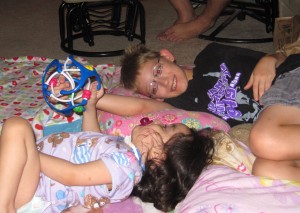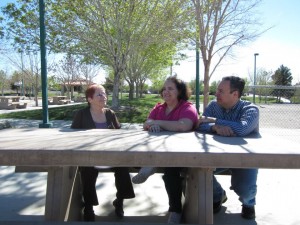
Even though she was no longer able to sit anymore and she was slowly losing her fine motor skills, Ethan found ways to interact with Hannah
One of our biggest concerns during Hannah’s illness, especially during the last few months of her life, was how her disease and her loss of skills and interaction was affecting her older brother and sister. There were very few articles published anywhere on the internet, and the ones we found were mostly discussing sibling loss as a typical kind of family loss where someone dies unexpectedly.
But kids like Hannah who live with progressive and degenerative diseases don’t pass unexpectedly. Ethan and Abigail watched as their sister learned skills such as playing with toys, crawling, cruising along the couch, and eating refried beans with her hands. Her developmental delays due to her disease meant she reached these milestones much later than developmentally normal kids, but they celebrated each new milestone right along with us.
They also watched her lose those skills over the course of a year to the point where she could no longer even roll over or hold anything in her hand. As the disease progressed, it was more difficult for them to be interactive with her. She eventually needed a tracheostomy to breathe and a G-tube to be fed. She went from being a child with “special needs” to being one that was “medically fragile,” requiring many ER visits and hospitalizations.
Playtime together became so difficult, but they took it upon themselves to no longer be playmates with her but to be comforting caretakers just as we were. They would help put her favorite shows on her iPad since she could no longer guide her hands. They would sing to her, hold her hands, make silly faces, or anything else that would put a smile on Hannah’s face.
I look back now and wonder how they were feeling at those times. I can’t even imagine what they thought of Hannah’s condition because they rarely asked us about it. They knew she had Gaucher’s Disease. They knew that the loss of these skills were part of the disease process. It wasn’t until we made the decision to bring her home with hospice care that they knew their little sister was going to die from this disease.
Yet looking back, they really accepted her limitations and did whatever they could think of to interact with her and entertain her.

Being interviewed for the educational seminar "Siblings: The Forgotten Mourners"
This past Wednesday afternoon, my husband, kids, and I were invited to take part in a educational seminar video regarding sibling loss due to disease. So hard to believe that this is one of the first of its kind focusing on this topic! It is being produced by the Learning Institute, and it’s audience is going to be nurses, social workers, and other people who work with kids living with an ill sibling.
Ethan was interviewed first, and then it was Abby’s turn. We weren’t close to them so we couldn’t hear how their interviews went, but I’m sure it matched their personalities and how they have dealt with Hannah’s death. Ethan, 11 years old, was probably quiet and didn’t say much about it. Abigail, almost 8 years old, was probably very open and was able to answer many of the questions she was asked.
Then my husband and I were interviewed. Being that this is a subject we are both passionate about, we were able to share a lot. We talked about Hannah, the kids’ relationship with her, how it affected our relationship with the kids, etc. We hope that we were able to get our point across at how important it is to recognize that the siblings needs to have understanding, help, and honesty when it comes to living with a significantly disabled brother or sister with a terminal illness.
One of our main areas of focus for the Little Miss Hannah Foundation is to promote the need for siblings to get the attention, help, and resources they need to help them cope with living with a sibling who is dying. Our “Abigails Angels” program that will be beginning in late July 2012 will primarily focus on the brothers and sisters.
We were lost when it came to finding guidance to help us help Ethan and Abigail understand and live with Hannah’s deteriorating condition. We want to do whatever we can to make sure that families of children diagnosed with life-limiting diseases do have resources and support to help all their children.